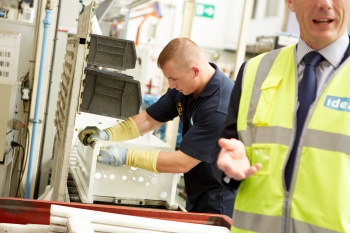A climate of change

Darren Finley of Ideal Commercial Boilers examines how the changes that will be demanded by Stage 2 of the Energy related Products Directive will also bring opportunities by forcing the industry to find better ways of sharing knowledge to achieve operational energy efficiency.
The UK is one of 15 member states of the European Union (EU) with a legally binding emission reduction commitment, all of which grew from the Kyoto Protocol agreement in 1992 and led to industry-changing legislation such as the UK’s Climate Change Act of 2008.
The changes continue. We are now under five months away from the implementation of the Energy-related Product (ErP) Directive’s stringent Stage 2 requirements, which will demand significantly higher minimum energy efficiencies for the most common energy-using products. The many different energy-related products covered under the directive are separated into categories or ‘lots’ and, not surprisingly considering they are used in the vast majority of heating systems in the UK and Europe and account for nearly half of the UK’s greenhouse emissions, boilers are placed prominently in Lot 1.
Leading boiler manufacturers are well prepared for the new legislation, and for good reason; all fossil-fuel boilers with outputs between 70 and 400 kW will need to meet strict minimum energy-efficiency requirements of 86% at 100% of the rated heat output and 94% at 30% of the rated heat input.
Appliances that do not meet the criteria will be ineligible for a CE mark and therefore not legally available for sale, which will effectively remove a section of boiler ranges from the portfolios of most commercial boiler manufacturers. However, leading manufacturers have been able to offer alternative ErP-compliant models for some time, and specifiers are advised to purchase from those who can also offer in-depth consultative advice as well as reliable technical backup.
 |
| Features to simplify the installation of modern energy-efficient boilers include frame and header kits as prefabricated modules. |
The second major part of the directive is the enforcing of energy labelling, designed to prove each appliance’s efficiency using a standard measurement and rating from G (the least efficient) to A+++ (the most efficient). Transparency of efficiency, then, is another major theme of the directive — one which is mirrored in other reforms in the industry including the promoted use of Building Information Modelling (BIM), all intended to make information more easily accessible across the construction industry and provided in a standardised, user-friendly format.
These fast-moving reforms to enable more effective knowledge sharing within the building industry have come at the perfect time —perhaps from the realisation that it will be vital if we are to meet ever-more stringent energy-efficiency requirements. Those responsible for designing or specifying a heating system upgrade in the next few months have decisions to make, some of which are time-dependent. Easy access to manufacturers’ information and knowledge early in the design stage will be invaluable.
The first consideration is whether to go ahead and commit to replacing an old standard-efficiency appliance with a condensing model.
Manufacturers have developed boilers that not only exceed the forthcoming ErP minimum-efficiency requirements, resulting in payback periods as short as three or four years, but that also offer a variety of features which simplify installation. Examples are frame and header kits for wall-hung boilers that are delivered to site with prefabricated pipes, pumps and accessories, or modular floor-standing boilers up to 1000 kW that are delivered to site in easy-to-transport modules and can fit through a standard doorway. These advantages mean savings in terms of the boiler engineers’ time on site and often eradicate the necessity for the hiring of additional equipment such as cranes or the need to widen entrances to enable access.
Another important consideration to make is that, until the cut-off date of 26 September this year, non-compliant ErP boilers can be fitted while merchant stocks last. Many will decide this is not the appropriate decision as they do not want to miss out on the reduced running costs.
 |
| Extensive R&D is necessary for manufacturers to develop boilers that are increasingly energy efficient and straightforward to specify. |
However in particular circumstances, such as unexpected boiler failure occurring a year or so ahead of plans to unroll a complete heating system refurbishment, it may be the most cost-effective and convenient option. On the other hand, there may be those who are considering an upgrade in the near future but whose boilers, although old and inefficient, are still operating relatively soundly. Manufacturers are prepared for this too, and many will continue to support these customers through their spares programmes.
The different stages of the ErP have been scheduled for gradual implementation over a number of years to enable manufacturers and the rest of the industry time to adjust and respond to the changes. This is vital to ensure success because, in addition to the extensive R&D necessary for manufacturers to develop boilers that are increasingly energy efficient and straightforward to specify, manufacturers need time to advise their customers on the best courses of action to take and the possible options that might be available to them.
Those with a long history in the industry and a strong technical-support team will be ideally placed to assist specifiers, contractors and engineers to make the right decisions as Stage 2 comes into play and, another three years down the line, when the ErP’s minimum requirements for nitrogen oxide (NOx) emissions are reduced in 2018. With the current climate forcing better communication and transparency in order to meet these targets, those within the industry will be better placed to respond to the challenges and reach ever-more innovative solutions.
Darren Finley is national sales director for Ideal Commercial Boilers.







